英语-福建省泉州市泉港区第一中学2018届高三上学期期末考试
- 格式:doc
- 大小:55.05 KB
- 文档页数:13

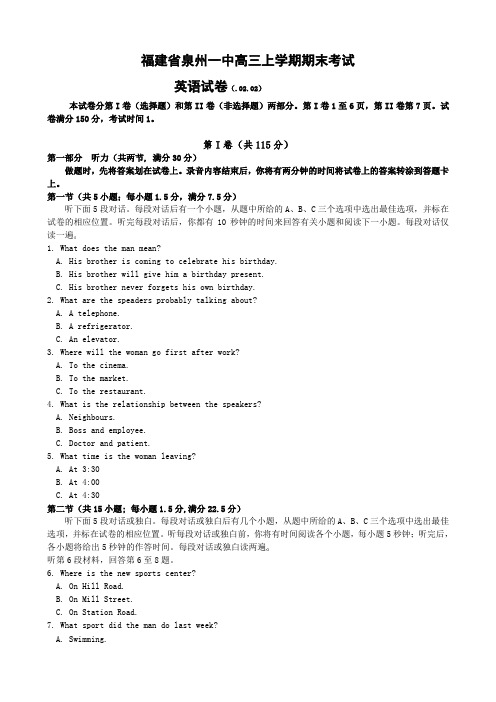
福建省泉州一中高三上学期期末考试英语试卷(.02.02)本试卷分第I卷(选择题)和第II卷(非选择题)两部分。
第I卷1至6页,第II卷第7页。
试卷满分150分,考试时间1。
第I卷(共115分)第一部分听力(共两节, 满分30分)做题时,先将答案划在试卷上。
录音内容结束后,你将有两分钟的时间将试卷上的答案转涂到答题卡上。
第一节(共5小题;每小题1.5分,满分7.5分)听下面5段对话。
每段对话后有一个小题,从题中所给的A、B、C三个选项中选出最佳选项,并标在试卷的相应位置。
听完每段对话后,你都有10秒钟的时间来回答有关小题和阅读下一小题。
每段对话仅读一遍1. What does the man mean?A. His brother is coming to celebrate his birthday.B. His brother will give him a birthday present.C. His brother never forgets his own birthday.2. What are the speaders probably talking about?A. A telephone.B. A refrigerator.C. An elevator.3. Where will the woman go first after work?A. To the cinema.B. To the market.C. To the restaurant.4. What is the relationship between the speakers?A. Neighbours.B. Boss and employee.C. Doctor and patient.5. What time is the woman leaving?A. At 3:30B. At 4:00C. At 4:30第二节(共15小题; 每小题1.5分,满分22.5分)听下面5段对话或独白。
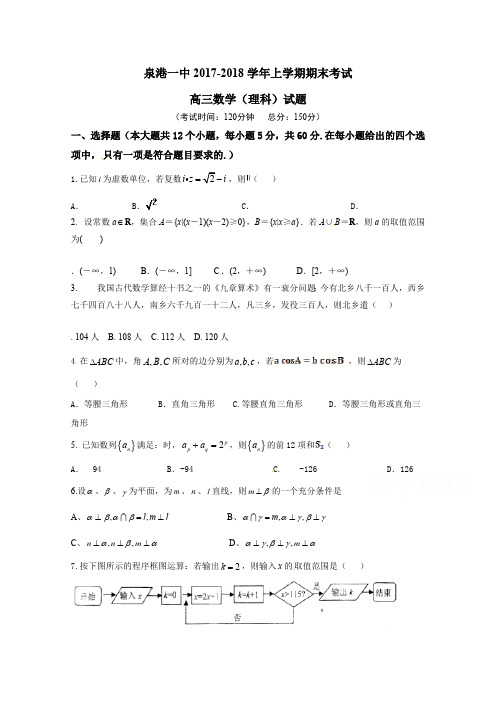
泉港一中2017-2018学年上学期期末考试高三数学(理科)试题(考试时间:120分钟 总分:150分)一、选择题(本大题共12个小题,每小题5分,共60分.在每小题给出的四个选项中,只有一项是符合题目要求的.)1.已知i 为虚数单位,若复数i z i =- ,则( ) A . B . C . D .2. 设常数a R ,集合A ={x |(x -1)(x -2)≥0},B ={x |x ≥a }.若A ∪B =R ,则a 的取值范围∈为( ).(-∞,1) B .(-∞,1] C .(2,+∞) D .[2,+∞)3. 我国古代数学算经十书之一的《九章算术》有一衰分问题:今有北乡八千一百人,西乡七千四百八十八人,南乡六千九百一十二人,凡三乡,发役三百人,则北乡遣( ) . 104人 B. 108人 C. 112人 D. 120人4.在ABC ∆中,角,,A B C 所对的边分别为,,a b c ,若,则ABC ∆为( )A .等腰三角形B .直角三角形 C.等腰直角三角形 D .等腰三角形或直角三角形5. 已知数列{}n a 满足:时,2p p q a a +=,则{}n a 的前12项和( ) A . 94 B .-94 C. -126 D .1266.设α、β、γ为平面,为m 、n 、l 直线,则m β⊥的一个充分条件是A 、,,l m l αβαβ⊥=⊥B 、,,m αγαγβγ=⊥⊥C 、,,n n m αβα⊥⊥⊥D 、,,m αγβγα⊥⊥⊥7.按下图所示的程序框图运算:若输出2k =,则输入x 的取值范围是( )A. (]20,25 B .(]30,57 C.(]30,32 D .(]28,578.已知变量,x y 满足条件23033010x y x y y +-≤⎧⎪+-≥⎨⎪-≤⎩,若目标函数z ax y =+仅在点()3,0处取得最大值,则a 的取值范围是( )A . 10,2⎛⎫ ⎪⎝⎭ B .1,02⎛⎫- ⎪⎝⎭ C . 1,2⎛⎫+∞ ⎪⎝⎭ D .1,2⎛⎫-∞- ⎪⎝⎭ 9. 如图,圆O 与x 轴的正半轴的交点为A ,点B ,C 在圆O 上,点B 的坐标为()1,2-,点C 位于第一象限,AOC α∠=,若BC =,则2sincos 222ααα+=( ) A. B.10. 已知,,A B P 是双曲线22221x y a b-=上的不同三点,且AB 连线经过坐标原点,若直线,PA PB 的斜率乘积23PA PB k k =,则该双曲线的离心率e =( ) AB11.一个棱锥的三视图如图所示,则该棱锥的全面积为( ) A B C D12.已知函数()2x f x e =,()1ln 2g x x =+,对a R ∀∈,()0,b ∃∈+∞,使得()()f a g b =,则b a -的最小值为( )A .ln 212+B .ln 212-C.1 D1第Ⅱ卷(非选择题共90分)二、填空题(本大题共4小题,每题5分,满分20分.)13. 设()()()25501251111x a a x a x a x +=+-+-++-…,则125a a a +++=… .14.如图,平面内有三个向量15. 设{a n }是等比数列,公比q =,S n 为{a n }的前n 项和。
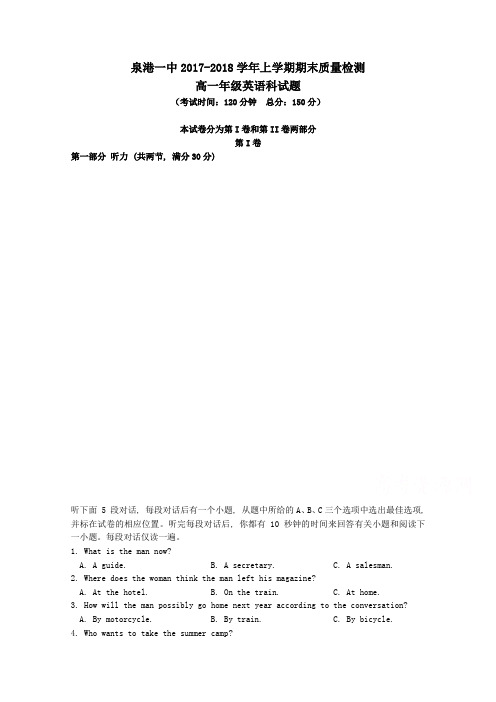
泉港一中2017-2018学年上学期期末质量检测高一年级英语科试题(考试时间:120分钟总分:150分)本试卷分为第I卷和第II卷两部分第I卷第一部分听力 (共两节, 满分30分)听下面 5 段对话, 每段对话后有一个小题, 从题中所给的A、B、C三个选项中选出最佳选项, 并标在试卷的相应位置。
听完每段对话后, 你都有 10 秒钟的时间来回答有关小题和阅读下一小题。
每段对话仅读一遍。
1. What is the man now?A. A guide.B. A secretary.C. A salesman.2. Where does the woman think the man left his magazine?A. At the hotel.B. On the train.C. At home.3. How will the man possibly go home next year according to the conversation?A. By motorcycle.B. By train.C. By bicycle.4. Who wants to take the summer camp?A. The woman’s daughter.B. The woman’s brother.C. The woman’s son.5. What will the woman do tonight?A. Look after her grandma.B. Go to a concert.C. Go shopping. 第二节(共15小题;每小题1.5分,满分22.5分)请听下面5段对话或独白。
每段对话或独白后有几个小题, 从每题所给的A、B、C三个选项中选出最佳选项, 并标在试卷的相应位置。
听每段对话或独白前, 你将有时间阅读各个小题, 每小题5秒钟; 听完后, 各小题将给出5秒钟的作答时间。
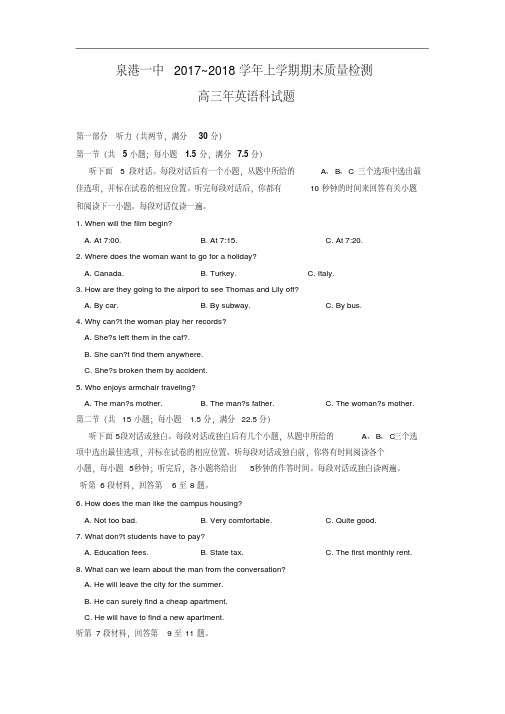
泉港一中2017~2018学年上学期期末质量检测高三年英语科试题第一部分听力(共两节,满分30分)第一节(共5小题;每小题 1.5分,满分7.5分)听下面5段对话。
每段对话后有一个小题,从题中所给的A、B、C三个选项中选出最佳选项,并标在试卷的相应位置。
听完每段对话后,你都有10秒钟的时间来回答有关小题和阅读下一小题。
每段对话仅读一遍。
1. When will the film begin?A. At 7:00.B. At 7:15.C. At 7:20.2. Where does the woman want to go for a holiday?A. Canada.B. Turkey.C. Italy.3. How are they going to the airport to see Thomas and Lily off?A. By car.B. By subway.C. By bus.4. Why can?t the woman play her records?A. She?s left them in the caf?.B. She can?t find them anywhere.C. She?s broken them by accident.5. Who enjoys armchair traveling?A. The man?s mother.B. The man?s father.C. The woman?s mother. 第二节(共15小题;每小题 1.5分,满分22.5分)听下面5段对话或独白。
每段对话或独白后有几个小题,从题中所给的A、B、C三个选项中选出最佳选项,并标在试卷的相应位置。
听每段对话或独白前,你将有时间阅读各个小题,每小题5秒钟;听完后,各小题将给出5秒钟的作答时间。
每段对话或独白读两遍。
听第6段材料,回答第6至8题。
6. How does the man like the campus housing?A. Not too bad.B. Very comfortable.C. Quite good.7. What don?t students have to pay?A. Education fees.B. State tax.C. The first monthly rent.8. What can we learn about the man from the conversation?A. He will leave the city for the summer.B. He can surely find a cheap apartment.C. He will have to find a new apartment.听第7段材料,回答第9至11题。
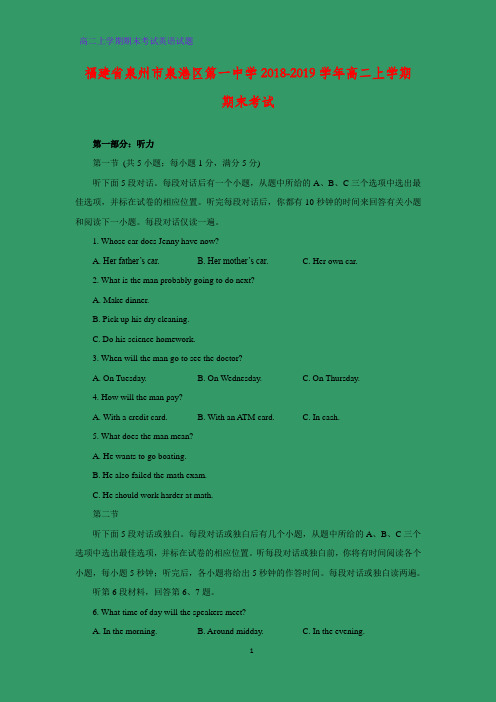
福建省泉州市泉港区第一中学2018-2019学年高二上学期期末考试第一部分:听力第一节(共5小题;每小题1分,满分5分)听下面5段对话。
每段对话后有一个小题,从题中所给的A、B、C三个选项中选出最佳选项,并标在试卷的相应位置。
听完每段对话后,你都有10秒钟的时间来回答有关小题和阅读下一小题。
每段对话仅读一遍。
1. Whose car does Jenny have now?A. Her father’s car.B. Her mother’s car.C. Her own car.2. What is the man probably going to do next?A. Make dinner.B. Pick up his dry cleaning.C. Do his science homework.3. When will the man go to see the doctor?A. On Tuesday.B. On Wednesday.C. On Thursday.4. How will the man pay?A. With a credit card.B. With an A TM card.C. In cash.5. What does the man mean?A. He wants to go boating.B. He also failed the math exam.C. He should work harder at math.第二节听下面5段对话或独白。
每段对话或独白后有几个小题,从题中所给的A、B、C三个选项中选出最佳选项,并标在试卷的相应位置。
听每段对话或独白前,你将有时间阅读各个小题,每小题5秒钟;听完后,各小题将给出5秒钟的作答时间。
每段对话或独白读两遍。
听第6段材料,回答第6、7题。
6. What time of day will the speakers meet?A. In the morning.B. Around midday.C. In the evening.7. Where are the speakers going to eat?A. On 14th Street.B. On Main Street.C. On Maple Avenue. 听第7段材料,回答第8至10题。
2018届高三上学期第一次月考英语试卷考试时间:120分钟满分:150分第I卷第一部分:听力(共两节,满分30分)第一节(共5 小题;每小题 1.5 分,满分7.5 分)1. Why does the woman ask the man to come?A. She feels cold.B. She wants to order some food.C. Something is wrong with the soup.2. Who will probably hold a party?A. The woman's friend.B. The man.C. The man's friend.3. What does the woman mean?A. The man should buy the suit.B. The man should change his job.C. The color of the suit is not suitable.4. What are the speakers doing?A. Enjoying their honeymoon.B. Attending a wedding.C. Seeing a movie.5. What does Maria think of studying English abroad?A. Useful and necessary.B. Useful but expensive.C. Useless and expensive.第二节(共15 小题;每小题 1.5 分,满分22.5 分)听下面一段对话,回答第6和第7两个小题。
6. What was the robber like?A. Dark skin and long black hair.B. Dark skin and short brown hair.C. Brown skin and short black hair.7. What does the woman remember about the robber's clothing?A. His T-shirt's color.B. His trousers' style.C. His jeans' color.听下面一段对话,回答第8和第9两个小题。
福建省泉州市泉港区第一中学2018-2019学年高二下学期期末考试英语试题(含答案)泉港一中2018-2019学年第二学期期末考试高二英语科试题(考试时间120分钟总分150分)第Ⅰ卷(选择题)第一部分听力(共两节,满分30分)第一节:(共5小题;每小题1.5分,满分7.5分)听下面5段对话。
每段对话后有一个小题,从题中所给的A、B、C三个选项中选出最佳选项,并标在试卷的相应位置。
听完每段对话后,你都有10秒钟的时间来回答有关小题和阅读下一小题。
每段对话仅读一遍。
例:How much is the shirt?A. £19. 15.B. £9. 18.C. £9.15.答案是C.1. What does the man want to drink?A. Coffee.B. Tea.C. Juice.2. When can they leave that afternoon according to the woman?A. Before 5:00.B. After 5:00.C. At 5:00.3. Where are the two speakers most probably talking?A. In a cotton field.B. On a farm.C. On a train.4. How many children does the woman have?A. Four.B. Three.C. Five.5. How did the woman read the book?A. She chose some chapters to read.B. She read it slowly.C. She went over the book chapter by chapter.第二节(共15小题;每小题1.5分,满分22.5分)听下面5段对话或独白。
每段对话或独白后有几道小题,从题中所给的A、B、C 三个选项中选出最佳选项。
福建省泉州市泉港区第一中学高三英语上学期第一次月考试题(考试时间120分钟总分150分)第Ⅰ卷第一部分听力(共两节,满分30分)做题时,先将答案标在试卷上,录音内容结束后,你将有两分钟的时间将试卷上的答案转涂到答题卡上。
第一节(共5小题;每小题1.5分,满分7.5分)听下面5段对话,每段对话后有一个小题。
从题中所给的A,B,C三个选项中选出最佳选项,并标在试卷的相应位置。
听完每段对话后,你都有10秒钟的时间来回答有关小题和阅读下一小题。
每段对话仅读一遍。
1.What dose the man like about the play?A.The story. B.The ending. C.The actor.2.Which place are the speakers trying to find?A.A hotel.B.A bank. C.A restaurant.3.At what time will the two speakers meet?A.5:20. B.5:10.C.4:40.4.What will the man do?A.Change the plan. B.Wait for a phone call. C.Sort things out.5.What does the woman want to do?A.See a film with the man. B.Offer the man some help.C.listen to some great music.第二节(共15小题;每小题1.5分,满分22.5分)听下面5段对话,每段对话后有几个小题,从题中所给的A、B、C三个选项中选出最佳选项,并标在试卷的相应位置。
听每段对话前,你将有时间阅读各个小题,每小题5秒钟;听完后,各小题给出5秒钟的作答时间,每段对话读两遍。
听第6段材料,回答第6、7题。
6.Where is Ben?A.In the kitchen. B.At school. C.In the park.7.What will the children do in the afternoon?A.Help set the table.B.Have a party. C.Do their homework.听第7段材料,回答8、9题。
泉州一中高三年(上)期末测验英语试卷一.听力测试(共两节,满分30分)听1-5段对话。
1. When will there be a birthday party?A. Next SundayB. Next MondayC. This Sunday2. What address is given by the woman?A.1120 East 32nd Street.B.1120 East 42nd Street.C.1220 East 32nd Street.3. What did the man buy?A. A suitcase.B. A briefcase.C. A cigarette case.4. What does the man want to know about the word?A. The pronunciation.B. The meaning.C. The spelling.5. What is the woman doing?A.Trying to go to sleep.B. Working on a problem.C. Writing a paper.听第6段材料,回答6-8题。
6. How many miles did the woman swim every week?A. 35B. 45C. 557. Why has the woman given up swimming?A.She is too old to swim.B.She cannot compete with others.C.She cannot win any international competitions.8. How old was she when she became famous?A. Twenty.B. Fifteen.C. Sixteen.听第7段材料,回答9,10题。
福建省泉州市泉港区第一中学2018届高三上学期期末考试第一部分听力(共两节,满分30分)第一节(共5小题;每小题1.5分,满分7.5分)听下面5段对话。
每段对话后有一个小题,从题中所给的A、B、C三个选项中选出最佳选项,并标在试卷的相应位置。
听完每段对话后,你都有10秒钟的时间来回答有关小题和阅读下一小题。
每段对话仅读一遍。
1. When will the film begin?A. At 7:00.B. At 7:15.C. At 7:20.2. Where does the woman want to go for a holiday?A. Canada.B. Turkey.C. Italy.3. How are they going to the airport to see Thomas and Lily off?A. By car.B. By subway.C. By bus.4. Why can’t the woman play her records?A. She’s left them in the café.B. She can’t find them anywhere.C. She’s broken them by accident.5. Who enjoys armchair traveling?A. The man’s mother.B. The man’s father.C. The woman’s mother.第二节(共15小题;每小题1.5分,满分22.5分)听下面5段对话或独白。
每段对话或独白后有几个小题,从题中所给的A、B、C三个选项中选出最佳选项,并标在试卷的相应位置。
听每段对话或独白前,你将有时间阅读各个小题,每小题5秒钟;听完后,各小题将给出5秒钟的作答时间。
每段对话或独白读两遍。
听第6段材料,回答第6至8题。
6. How does the man like the campus housing?A. Not too bad.B. Very comfortable.C. Quite good.7. What don’t students have to pay?A. Education fees.B. State tax.C. The first monthly rent.8. What can we learn about the man from the conversation?A. He will leave the city for the summer.B. He can surely find a cheap apartment.C. He will have to find a new apartment.听第7段材料,回答第9至11题。
9. Why is the woman upset with the man?A. He missed the lecture.B. He didn’t make a call.C. He refused to apologize.10. When will they see each other?A. On Tuesday.B. On Thursday.C. On Friday.11. What is the possible relationship between the two speakers?A. Doctor and patient.B. Professor and student.C. Manager and secretary. 听第8段材料,回答第12至14题。
12. What did Rosa think of the trip to the museum?A. Tiring.B. Boring.C. Amazing.13. How many of the paintings did Rosa see?A. Very few of them.B. About half of them.C. Almost all of them.14. Whose paintings did Rosa like most?A. Diego Rivera’s.B. Frida Kahlo’s.C. Henri Matisse’s.听第9段材料,回答第15至17题。
15. What did Brian do yesterday?A. Saw a film.B. Watched TV.C. Did some shopping.16. Why did Mary call Brian?A. To ask him for some suggestions.B. To ask him to help with her work.C. To invite him to her birthday party.17. What are the two speakers going to do next Friday?A. Buy some drinks.B. Go to a piano concert.C. Give a birthday party. 听第10段材料,回答第18至20题。
18. What might the speaker be?A. A park manager.B. A restaurant owner.C. A tourist guide.19. How was the Washington Elm(榆树)later on?A. It was destroyed in a storm.B. It was cut down by attackers.C. It was replaced by another tree.20. What is the speaker mainly talking about?A. A well-known park.B. A historic tree.C. A famous commander.第二部分阅读理解(共两节,满分40分)第一节(共15小题;每小题2分,满分30分)阅读下列短文,从每题所给的A、B、C和D四个选项中,选出最佳选项,并在答题卡上将该项涂黑。
ANavigating Border SecurityYou may think what you say on WeChat is your own business, but apparently the Canadian authorities don’t agree. In other words, you need to be fully aware of the items you’re not allowed to bring before you travel abroad.Obscene(淫秽) and pirated(盗版) materialsIn many Western countries, possessing and transporting underage porn(黄色书刊) is considered a serious crime. According to the United States Department of Justice, a first-time offender charged with producing child porn faces fines and 15 to 30 years in prison. The website of UK Visas and Immigration also listed pirated copies of movies and music as illegal, because they infringe upon intellectual property rights. If you’re caught bringing pirated products into the UK, the products will be confiscated, and you may face prosecution(起诉).Food, animals and plantsAccording to Australia’s Department of Immigration and Border Protection, Australia has strict quarantine laws. Animals from overseas could bring diseases and pests into the country and destroy the local environment.CashThere is a limit of cash you can bring when traveling abroad. According to UK Visas and Immigration, the maximum amount of cash(including bankers’ drafts and checks) you can bring into the country is £10,000(72,000 yuan). You’ll have to declare it if you’re brining more, or youcould face a fine of up to £5,000 (46,000 yuan). But if you’re entering the UK from another European Union country, you don’t need to declare your cash, no matter how much you have.Other itemsCustoms rules vary from country to country. For example, when entering Australia you also need to declare traditional medicines because they may contain endangered plant or animal products. Heritage-related goods, including artworks and stamps, also need to be declared. This is why you should always check the local customs website to make sure of what you can put into your luggage, and of course, your electronic devices.21. Which of the following items may be allowed to bring without declaring when you enter Australia?A. Traditional medicinesB. Pet dogs and catsC. Stamp albumsD. Story books22. What can we know from the passage?A. Travelers should declare their cash when entering the UK from GermanyB. Both the USA and the UK have laws against obscene and pirated materialsC. You can bring more than £10,000 without declaring when you enter the UK from ChinaD. Taking traditional medicines to Australia may destroy the local environment23. Where is the article above probably taken from?A. A travel brochureB. A fashion magazineC. An exhibition guideD. A science reportBSince I was first in China in 2012, my life, and China itself, have developed and changed a lot. My first China interaction was in 2012, when I came here with a friend. We traveled from Beijing to Hong Kong, all in 5 weeks. We had a fantastic time meeting local people, exploring beautiful places and eating delicious food. After this experience traveling across China and eating local food, I really wondered “How did I live without eating dumplings and eggplant on a weekly basis?” Well, I guess I did, somehow, for 22 years!As my Chinese improved during my studies I became more independent and more aware of the possibilities of Waimai, or food home delivery. I suddenly noticed the thousands of Waimai drivers zooming across the roads on their motorcycles. On deep, dark Beijing winter days andrainy days, Waimai is like the holy grail and as I enjoyed my take - away dumplings I would think and laugh to myself, “How did I live before without being able to get Waimai?” Well, I guess I did, somehow, for 23 years!In mid-2015, I was back in China again for my master's degree. That's when I came across my first Mobike: “Oh, that’s a unique bike and surely it will get stolen soon ”, I thought as I passed on my own black bike. But one week passed and I saw it still there. Then the one Mobike sighting turned into two and three, and soon thousands and then seemingly overnight the streets of Beijing were flooded with orange and yellow wheels. Again, I wondered on how I ever lived without my shared bike account. Well, I guess I did, somehow, for 25 years!China today is a country still steeped in ancient knowledge and custom, yet one that is also bursting with new ideas and changes. Although some things will always stay the same, something else is constant ly changing at a pace beyond comprehension. I’m sure as I continue my life here in Beijing I will be swept up in the next new convenience of life that China’s rapid development is bringing out.24. According to the first paragraph, what impressed the author most might be ________.A. Chinese cultureB. Chinese foodC. Chinese peopleD. Chinese history25. The underlined words holy grail in Paragraph 2 probably means________.A. something preciousB. something deliciousC. something expensiveD. something unavailable26. What might be the author’s attitude towards Mobike after it boomed?A. Doubtful.B. CuriousC. Shocked.D. Regretful.27. What can be inferred from the passage?A. Chinese ancient wisdom has been replaced by new ideas.B. China is changing steadily and slowly.C. China will always stay as what it was.D. People in China will live a more convenient life in the future.CWhen ordering food only takes a few minutes using a smar tphone, it’s only natural that food deliveries have become part of college life. However, a university in Guangxi Zhuang autonomous region is trying to put a stop to this trend on its campus.On Nov 1, Guangxi University of Foreign Languages banned food delivery services and disposable food boxes, both to its campus and dormitories.The ban immediately received fierce criticism from the university’s students, as well as internet users. Some complained that the ban made campus canteens very crowded. “There a re not enough seats in the canteen, which forces us to eat standing up or squatting,” a student in the university surnamed Tan told Guangxi Television.The crowded canteens also mean that extra time is spent dining, which could have been used to nap during the lunch break. Some even complained that the canteen only provides a few dishes, most of which don’t taste so great.Su Junlv, from the university’s student affairs office, explained that the ban was carried out because off-campus food posed safety ris ks for students. It’s believed that take-away food had created a serious garbage problem, as there were often a large number of used food boxes found in campus garbage cans after students had finished their meals.According to Su, the ban was also brought in to help students develop a healthy lifestyle. “While food delivery services bring convenience, they let students form some lazy habits,” Su told Xinhua. “They spend a whole day in the dorm playing video games, watching TV soap operas and ordering food o nline.”However, in the eyes of Liu Junhai, a professor at Renmin University of China, there are other approaches that universities could take to improve their students’ meal times. “Universities should explore how to improve the dining experience in the canteens, such as the queuing and variety of dishes,” he told Xinhua.28. What does the passage mainly talk about?A. The convenience brought by food delivery.B. The effect of crowded canteens on students.C. A solution to stop students becoming lazy.D. A ban on food delivery in campus.29. In students’ opinion, what would be caused after the ban was carried out?A. It would take students less time to eat in the canteen.B. Students would enjoy various tasty dishes in the canteen.C. Some students may have their meals without seats in the canteen.D. Students would have a longer nap during lunch break.30. According to Su Junlv, the ban is intended to ________A. tell the students all off-campus food is unhealthy.B. rid the campus of used food boxes.C. force students to spend less time on entertainment.D. improve the dining experience in the canteens.31. What can we infer about Liu Junhai’s attitude to the ban?A. NegativeB. SupportiveC. IndifferentD. SkepticalDThat people often experience trouble sleeping in a different bed in unfamiliar surroundings is a phenomenon known as the First-night, effect. If a person stays in the same room the following night they tend to sleep more soundly. Yuka Sasaki and her colleagues at Brown University set out to investigate the origins of this effect.Dr. Sasaki knew the first-night effect probably has something to do with how humans evolved.The puzzle was what benefit would be gained from it when performance might be affected the following day. She also knew from previous work conducted on birds and dolphins that these animals put half of their brains to sleep at a time so that they can rest while remaining alert enough to avoid predators (捕食者). This led her to wonder if people might be doing the same thing. To take a closer look, her team studied 35 healthy people as they slept in the unfamiliar environment of the university’s Department of Psychological Sciences. The participants each slept in the department for two nights and were carefully monitored with techniques that looked at the activity of their brains. Dr. Sasaki found, as expected, the participants slept less well on their first night than they did on their second, taking more than twice as long to fall asleep and sleeping less overall. During deep sleep, the participants’ brains behaved in a similar manner seen in birds and dolphins. On the first night only, the left hemispheres (半球) of their brains did not sleep nearly as deeply as their right hemispheres did.Curious if the left hemispheres were indeed remaining awake to process information detected in the surrounding environment, Dr. Sasaki re-ran the experiment while presenting the sleeping participants with a mix of regularly timed beeps (蜂鸣声) of the same tone and irregular beeps ofa different tone during the night. She worked out that, if the left hemisphere was staying alert to keep guard in a strange environment, then it would react to the irregular beeps by stirring people from sleep and would ignore the regularly timed ones. This is precisely what she found.32. What do we learn about Dr. Y uka Sasaki doing her research?A. She found birds and dolphins remain alert while asleep.B. She found birds and dolphins sleep in much the same way.C. She got some idea from previous studies on birds and dolphinsD. She conducted studies on birds’ and dolphins’ sleeping patterns.33. What did Dr. Sasaki do when she first did her experiment?A. She monitored the brain activity of participants sleeping in a new environment.B. She recruited (招募) 35 participants from her Department of Psychological Sciences.C. She studied the differences between the two sides of participants’ brains.D. She tested her findings about birds and dolphins on human subjects.34. What did Dr. Sasaki do when re-running her experiment?A. She analyzed the negative effect of irregular tones on brains.B. She recorded participants’ adaptation to changed environment.C. She exposed her participants to two different stimuli (刺激物).D. She compared the responses of different participants.35. What did Dr. Sasaki find about the participants in her experiment?A. They tended to enjoy certain tones more than others.B. They tended to recognize irregular beeps as a threat.C. They felt sleepy when exposed to regular beeps.D. They differed in their tolerance of irregular tones第二节七选五(共5小题;每小题2分,满分10分)根据短文内容,从短文后的选项中选出能填入空白处的最佳选项。